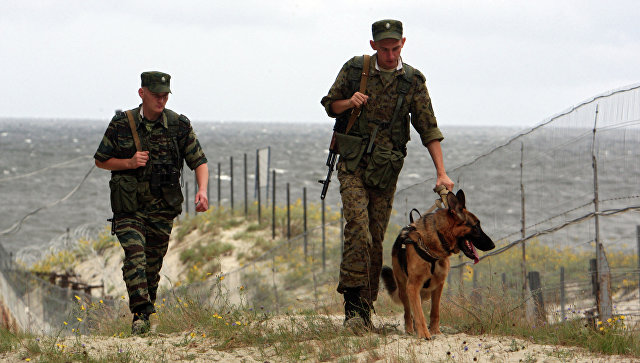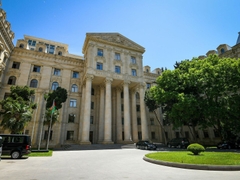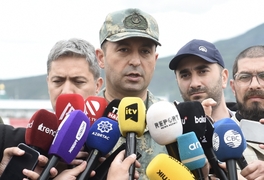Azerbaijan and Russia conducted joint cross-border security exercises to beef up security along the 338 kilometer-long shared border, from May 29 – June 4. Azerbaijani and Russian police, border guards and special services carried out wide-ranging pre-planned actions, including random passport checks and vehicle inspections.
Land and sea cross-border cooperation efforts are considered a key component to bilateral ties between Baku and Moscow, as they take into account security concerns in the Caucasus specifically, and international terrorism more broadly.
“Azerbaijani-Russian relations have always been friendly and good-neighborly, and this fact has largely been due to the rationality of Azerbaijan’s foreign policy and good relations between the presidents of Russia and Azerbaijan,” Vyacheslav Smirnov, Director of the Russian Institute of Political Sociology, said.
“I would especially note the development of relations in the sphere of military-technical cooperation, within which Azerbaijan acts as Russia's strategic partner in the region, as well as cooperation in the field of combating international terrorism and cross-border crime,” Smirnov added.
Russia’s unstable North Caucasus region, particularly the republics of Chechnya and Dagestan, which border the South Caucasus countries of Georgia and Azerbaijan, used to be an important supplier of fighters to rebel and terrorist groups in Syria and Iraq.
In October 2015, President Vladimir Putin had stated that the number of Russian’s traveling to Syria to join the Islamic State (IS) was 2,400, more than three times the amount a year earlier. Russia’s Interior Ministry and the Federal Security Service have said that they were tracking movements of over 2,800 Russians who are fighting in Syria and Iraq.
The Kremlin maintains that these home-grown rebels from the region pose a direct threat to Russia’s national security, fearing that their return to Russia after taking up arms in the Middle East could again destabilize the region. The Russian republic of Chechnya in the North Caucasus, which shares a border with Georgia, is undoubtedly the focal point of Moscow’s thinking in this regard.
Since the fall of the Soviet Union in 1991, the region is no stranger to large-scale insurgencies. Tens of thousands of people were killed in the 1994-1996 war between the Russian military and insurgents in Chechnya, and tens of thousands more died after Russian security forces re-entered Chechnya in 1999. In August 1999, Chechen militants invaded the neighboring Russian republic of Dagestan, which borders Azerbaijan, to support a local separatist movement, prompting Russia to launch the Second Chechen War.
Moscow has justified its involvement in the Syrian conflict with its desire to keep rebels far away from Russian borders, and cross-border security cooperation with Azerbaijan is viewed as a reliable tool for border protection.
“We are most certainly concerned about two hotbeds of instability, in Afghanistan and in the Middle East, that are situated in the immediate vicinity of the Russian, Azerbaijani and Iranian borders,” Russian President Vladimir Putin told Azerbaijan’s Azartac news agency last August.
“They pose a grave threat of international terrorism and cross-border crime primarily due to the increased drug flow, arms trafficking and movement of fighters,” Putin added.
Codenamed “Border-Shield,” the most recent phase of the joint cross-border exercises covered Russia’s Dagestani volatile border regions and Azerbaijan’s Quba, Qusar, Xacmaz, Balakan, Zaqatala, Qax, Shaki, Oguz and Qabala districts.
The operations are characterized as a strategic partnership by both Putin and Azerbaijan’s President Ilham Aliyev, and considered multipurpose. Foiling attempts by rebels in the North Caucasus to travel to Syria via Azerbaijani and Georgia is one such purpose.
“The objectives of the annually-held operations are to carry out complex organizational-practical actions to expose and capture transnational organized criminals, discover sources of illegal arms and ammunition, explosives and explosive devices, narcotics, and finances used for illegal purposes,” a joint press release issued on June 6 by the operation’s headquarters read.
The week-long operations netted 29 people wanted for committing various crimes, as well as an additional 13 people declared wanted by Russia. Meanwhile, the whereabouts of three people believed to have gone missing were determined.
In addition to 56 wanted debtors being nabbed, illegally possessed firearms and ammunition were confiscated. These included eight automatic weapons, 13 pistols, 66 smoothbore shotguns and rifles, 53 hand grenades, 25 weapon magazines, 29 various pieces of military equipment and ammunition, and over 7,000 cartridges of various calibers.
Fifteen drug-related cases were revealed, 600 grams of marijuana were seized and 39,396 cannabis bushes to the tune of 10,306 kg were burnt. Moreover, 16 different crimes committed in the border regions were disclosed, according to the joint press release issued.
Azerbaijan and Russia also collaborate in the Caspian Sea on anti-smuggling, anti-poaching and oil field security operations. Regular naval drills are conducted to eliminate security threats, and to ensure trade safety and the protection of vast oil and natural gas fields that lie beneath the water.







 Azerbaijan Railways (ADY) has successfully completed the reconstruction of the cargo yard located in the Astara region of Azerbaijan to ensure the ...
Azerbaijan Railways (ADY) has successfully completed the reconstruction of the cargo yard located in the Astara region of Azerbaijan to ensure the ...
 Turkmenistan's Foreign Minister Rashit Meredow and EU's Special Representative for Central Asia Terhi Hakala have discussed prospects for cooperati...
Turkmenistan's Foreign Minister Rashit Meredow and EU's Special Representative for Central Asia Terhi Hakala have discussed prospects for cooperati...
 In a high-profile trial that has gripped the nation, Kuandyk Bishimbayev, Kazakhstan’s former economy minister, has been sentenced to 24 years in p...
In a high-profile trial that has gripped the nation, Kuandyk Bishimbayev, Kazakhstan’s former economy minister, has been sentenced to 24 years in p...
 Foreign Minister of Azerbaijan Jeyhun Bayramov met with his Armenian counterpart Ararat Mirzoyan in Almaty, Kazakhstan, to negotiate the peace agenda.
Foreign Minister of Azerbaijan Jeyhun Bayramov met with his Armenian counterpart Ararat Mirzoyan in Almaty, Kazakhstan, to negotiate the peace agenda.



